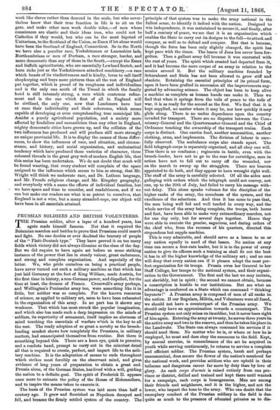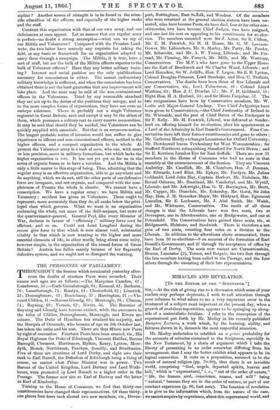PRUSSIAN SOLDIERS AND BRITISH VOLUNTEERS.
THE Prussian soldier, after a lapse of a hundred years, has again made himself famous. Not that it required the Bohemian marches and battles to prove that Prussians could march and fight. No one doubts or ever doubted the bravery of people of the " Platt-Deutsch type." They have proved it on too many fields which victory did not always illumine at the close of the day. But we did require to have again set before us some striking instance of the power that lies in steady valour, great endurance, and strong and complete organization. And especially of the latter. We, who pride ourselves on being a practical people, have never turned out such a military machine as that which has just laid Germany at the feet of King William, made Austria, for the first time in history, a non-German power, and dispelled, for the time at least, the dreams of France. Cromwell's army perhaps, and Wellington's Peninsular army too, were something like it in little, but neither was so complete. For the known resources of science, as applied to military art, seem to have been exhausted in the organization of this army. In no part has it shown any weakness. That which has most struck the popular imagination, and which also has made such a deep impression on the minds of soldiers, its superiority of armament, itself implies an alertness of mind touching the essentials of warfare which is the key to all the rest. The ready adoption of so great a novelty as the breech- loading musket shows how completely the Prussians, in military matters, had emancipated themselves from routine. But there is something beyond this. There are a keen eye, quick to perceive, and a resolute hand, prompt to carry out in the minutest detail all that is required to create, perfect, and impart life to the mili- tary machine. It is the adaptation of means to ends throughout which strikes most forcibly on the observant mind, and gives evidence of long years of preparation to obtain a great end. Prussia alone, of the German States, has lived with a will, guiding the nation to a definite goal. The spirit of Frederick II. appears once more to animate the policy of the House of Hohenzollern, and to inspire the means taken to execute it.
The basis of the Prussian system was laid more than half a century ago. It grew and flourished as Napoleon decayed and fell, and became the firmly settled system of the country. The principle of that system was to make the army national in the fullest sense, to identify it indeed with the nation. Designed to win independence, it was maintained to secure it, and finally, after half a century of peace, we see that it is an organization which • enables the State to carry out its designs to the full—to attack and conquer, as well as to defend and conquer. But that is because, though the form has been only slightly changed, the spirit has kept pace with the times. The lesson of Jena has never been for- gotten. Then a gallant army fell because it was encrusted with the rust of years. The spirit which created had departed from it, and it had become the mere corpse of an army in relation to the armies around it. But the military machine founded by Scharnhorst and Stein has not been allowed to grow stiff and obsolete. Retaining the essential principles of its primal form,. upon it have been grafted in succession all the improvements sug- gested by advancing science. The object has been to keep alive a machine as complete as human hands can make it. Thus we find that when it springs from the toils of peace to the toils of war, it is as ready for the second as the first. We find that it is kept supplied, no matter where it may be, nor how quickly it may along. There is no undue dependence upon the country
invaded for transport. There are no disputes between the Com- missary-General and the Quartermaster-General and the Chief of Ordnance touching the ownership of the transport trains. Each corps is distinct. One carries food, another ammunition, another clothing, arms, and implements. The division of labour is care- fully observed. The ambulance corps also stands apart. The field telegraph corps is separately organized, and all obey one will. Thus there is no confusion ; regiments in battle, even with the breech-loader, have not to go to the rear for cartridges, men in action have not to fall out to carry off the wounded, nor on the march to sweep up the stragglers. There are bearers- appointed to do both, and they appear to have wrought right well. The staff of the army is carefully selected. Of all the aides sent galloping with orders which the telegraph could not convey, not one, up to the 20th of July, had failed to carry his message with- out delay. This alone speaks volumes for the discipline of the higher ranks of the army, the soundness of the system, and the excellence of the selections. And thus it has come to pass that, the men being well fed and well tended in every way, and the whole service of the army being complete, the troops, both horse- and foot, have been able to make very extraordinary marches, not for one day only, but for several days together. Hence they were able to execute the precise, sagacious, and daring orders of the chief who, from the recesses of his quarters, directed this stupendous but supple machine.
This is very admirable, and should serve as a lesson to us or any nation equally in need of that lesson. No nation at any time can secure a first-rate leader, but it is in the power of every nation to give its officers such a training as shall fit out the best it has in all the higher knowledge of the military art ; and no one: will deny that every nation can if it pleases adopt the most per- fect organization for its troops. Prussia owes her General to her Staff College, her troops to the national system, and their organi- zation to the Government. The first and the last we may imitate, not slavishly, but in spirit ; the second we cannot obtain, because a conscription is hostile to our institutions. But see what an advantage is conferred on a State which can command " thinking bayonets!" A Prussian army is composed of men of all ranks im the nation. If our Regulars, Militia, and Volunteers were all fused,, we should not have a counterpart of the Prussian army. We should only have an approximation towards a counterpart. The Prussian system not only seizes on its soldier, but it never loses sight of him again. Entering the army at twenty, he serves three years in, the active army and two in the reserve, and then he takes his place in. the Landwehr. The State can always command his services if it should need them. No matter who he is, or where or how he is- employed, he must and does obey the summons to the field. Kept,. by annual exercise, in remembrance of the art he acquired in. youth while serving continuously, he returns to service a complete- and efficient soldier. The Prussian system, harsh and perhaps uneconomical, does secure the flower of the nation's manhood for the national work, and provides soldiers who are upheld in their toilsome and dangerous career far more by duty than by love of glory. As each carps d'arme'e is raised entirely from one pro- vince or district, drilled and trained and kept there until wanted for a campaign, each corps is homogeneous. Men are among their friends and neighbours, and it is the higher, and not the lower, who impart the tone to the army. Who can doubt that the exemplary conduct of the Prussian soldiery in the field is due quite as much to the presence of educated privates as to dis-
cipline ? Another source of strength is to be found in the scien- tific education of the officers, and especially of the higher ranks and the staff.
Contrast this organization with that of our own army, and our deficiencies at once appear. Let us assume that our regular army is perfect—no doubt a strong assumption—what can we say of our Militia and Volunteers? Compared with the Prussian Land- wehr, the two latter have scarcely any requisite for taking the field, or any basis or framework for an organization adapted to carry them through a campaign. The Militia, it is true, have a sort of staff, but are the bulk of the Militia officers superior to the bulk of Volunteer officers? Have they any better military train- ing ? Interest and social position are the only qualifications necessary for commissions in either. The merest rudimentary military knowledge is sufficient, and when the commission has been obtained there is not the least guarantee that any improvement will take place. And the same may be said of the non-commissioned officers in the Volunteers. Tried by any reasonable standard they are not up to the duties of the positions they occupy, and as to the more complex forms of organization, they have not even an embryo existence. There is probably not a single Volunteer regiment in Great Britain, save and except it may be the oldest of them, which possesses a solitary cart to carry reserve ammunition. It may be said that should they be needed, the Volunteers can be quickly supplied with essentials. But that is an erroneous notion. The longest probable notice of invasion would not suffice to give experience to officers and non-commissioned officers, method to the higher officers, and a compact organization to the whole. At present the Volunteer army is a mob of men, who can, with more or less precision, move in military formations, but which lacks the higher organization in toto. It has not yet got as far on in the series of organic forms as to have a vertebra. And the Militia is only a little nearer to this stage of being. Thus, admitting that the regular army is an effective organization, able to go anywhere and do anything, which we do not, still the other parts of our defensive force are inorganic, and not organic, and compared with the com- pleteness of Prussia the whole is chaotic. We cannot have a conscription. We have a regular army ; we have Militia and Yeomanry ; accident has given us Volunteers. These ought to represent, more accurately than they do, all ranks below the privi- leged class which governs. What we want is an organization embracing the whole, not more of the drill-serjeant, but more of the quartermaster-general. General Peel, like every Minister of War, declares in favour of " efficiency ;" military force must be efficient, and so on. Could not Lord Longford during the recess give form to that which is now almost void, substantial vitality to that which is now wanting in the higher and more essential elements of life, in other words, bring about some unity, however simple, in the organization of the armed forces of Great Britain? Austria has fallen mainly because of her flagrantly defective system, and we ought not to disregard the warning.































 Previous page
Previous page